Deimatic Sophistry: The Art of Arguing Annoyingly
Why every social media scuffle boils down to the same irritating trope
I’ve written before about a personality type that I absolutely cannot stand – the bored asshole with a superiority complex and a density of smug that, consumed by its own gravity, collapses the face into a state of obnoxious squinty little fuckshit.
I call it a Pollux because of how closely they resemble the character Pollux Troy from Face/Off.
I want to talk about an often Pollux-related style of internet discourse that I see all the time on social media—and I stress that this is entirely an internet phenomenon. You do see Polluxes in the offline world (just go to any college campus and look for a group with a name like “young conservatives”) but something you only ever see online is a kind of discourse that I’m going to call deimatic sophistry.
And I’m going to call it that because, to the best of my knowledge and a Google search, nobody has ever used that phrase before and I like that I’ve coined something.
You might be aware of the term deimatic behaviour. You see it in the animal kingdom whenever a puffer fish blows itself up or a caterpillar stands up and flashes spots that look like a snake’s eyes. The animal in a state of vulnerability presents itself as being much bigger and more intimidating. The more threatened it feels, the more it’s likely to lean into deimatic display to fool its attacker into thinking it’s no match for what is, in reality, a very scared prey animal surrendering to a biological panic instinct.
The way this manifests itself in social media is thus: A verbal assailant, commonly a Pollux though not necessarily (alternatively, a Boebert or a Gammon) experiences resistance to what they initially felt was a slam dunk, a private own delivery—an L-a-gram. In self-defence, their whole demeanour and manner of speaking changes, they excrete a monocle from their sleeve and start talking like they’re quoting fucking Walden.
To illustrate, a Twitter conversation helpfully annotated with probably the Platonic ideal of the Pollux, Martin Shkreli:
The reason that this kind of exchange only happens online is kind of simple when you think about what’s really happening on their side—frantically clicking through Thesaurus Dot Com and Googling the meanings of words they think they know how to use but don’t want to embarrass themselves by getting it wrong. You can also tell when they’ve decided to bring out the really big guns and tab over to the fallacy website, because they’ll suddenly start speaking a shit ton of Latin at you as though you just vomited pea soup into their lap.
“But Sped,” you might be saying, “Aren’t you basically proving their point by getting all shirty about people using words that usually aren’t even that big, and smart people often sound pretentious by their nature?”
No! It’s a fucking thing, everyone notices this. Everyone who has ever argued with someone like this has noticed it and been annoyed by it, they’ve noticed but they might not quite know how to articulate what exactly is annoying them. Well I do, it’s called deimatic sophistry because I came up with this and that’s what it’s called now.
Of course this has all come about fairly recently as a consequence of all the Ben Shapiro-esque “logic bot” style of rhetoric that has emerged as a direct counter to the perception that science is a “lefty” thing that conservative God-botherers with their magic beans have tried to burn at the stake since the year dot. The tides have to turn, the narrative has to be upended, conservatives have to be seen as the cold computorial sense-makers in a world of whiny emotional crybabies. It generates the kind of contradiction that sees Matt Walsh espousing the superiority of logic over faith and then immediately becoming stumped by a question about how that gels with his deity walking on water.
When it’s perceived that the strength of your position is very strongly tied to how many or few emotions are involved, you become terrified of giving the impression that you feel anything. And things like humour and casual speech all get caught up in the feelings net. Or at least they skirt so dangerously close to emotion that it’s best to take a wide berth around them and stick to trying your best Vision from the Marvel movies impression.
The reason that it’s so pronounced and obvious is because, very often, the portrayal is actually the stupid persons idea of a smart person. This is, incidentally, why fiction writers often struggle with writing characters who are more intelligent than the writer is. You have to try to find other ways to show their intelligence without betraying the fact that a character cannot be smarter than their author. Fail this task and you wind up with a fictional genius of such lofty cerebral repute that they dare consult The Dictionary. They’ll even name the dictionary so you know it’s the one geniuses use.
It's the mental equivalent of Donald Trump eating McDonalds all day because that’s what children think very rich adults do, because it’s what they themselves would do. One of the great misunderstandings of today’s infuriating modern debate culture is that you instantly win the argument if your opponent uses an adverb.
It is okay to talk like a normal person. Like this person did when they initially confronted me with a bunch of yellow face gifs and told me to water emoji myself. That was obnoxious but it was much closer to authenticity than the stilted bullshit that came later. Sure, a lot of people talk like wankers naturally, but it’s more obvious when you change into a wanker after initially talking like a mere dipshit.
Don’t talk like you’re frantically waving a shiny thing at an attacker or dropping your tail and bolting in another direction while we stare at the wriggling appendage trying to figure out what you meant when you said we were committing a tu quoque.
You think we can’t tell. But we can. We really can.














I can't even see that pic of Shkreli without my hand forming a fist.
Great piece. I swear to god if I see one more weirdo saying “umm maybe debate me without an ad hominem” I might actually go insane